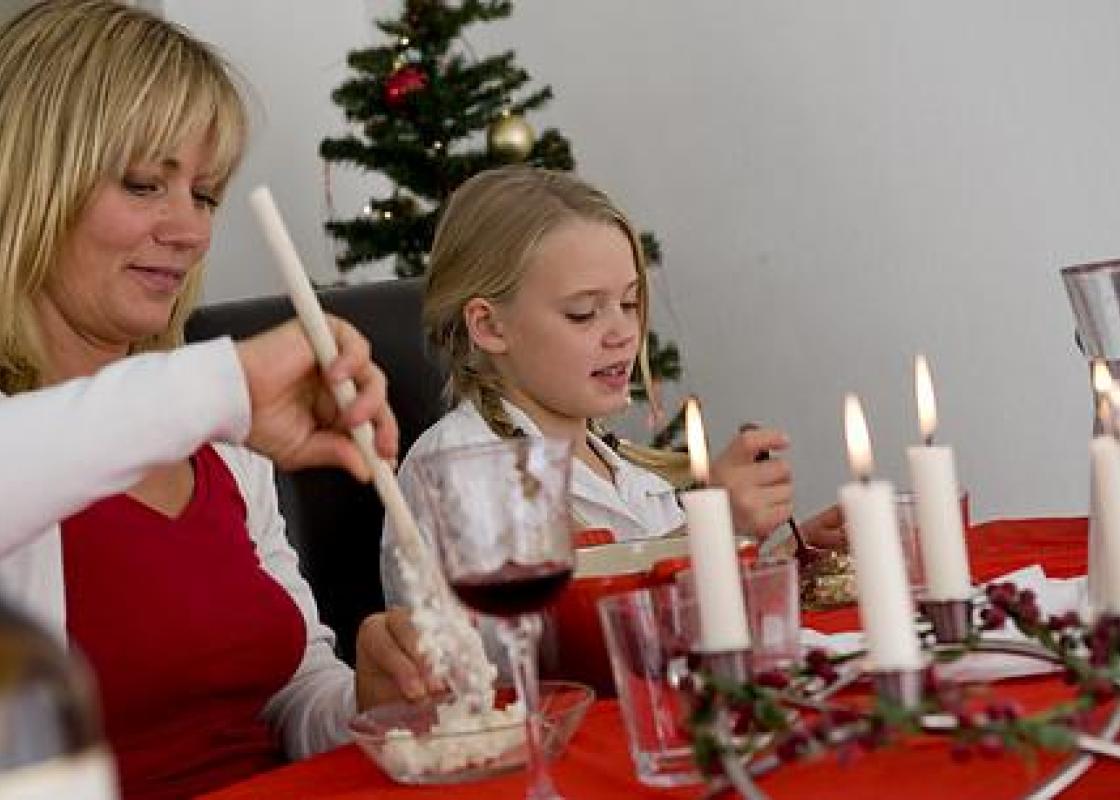"Men's contribution is getting the Christmas tree," says Kristine Warhuus Smeby.
"A few men, those who like cooking, may also be responsible for the Christmas dinner. They don't necessarily like cooking fish fingers on a Wednesday, but they enjoy preparing a big Christmas feast. And if they do, they take responsibility for the whole feast, from planning and preparation to completion."
Apart from buying the Christmas tree and making the odd Christmas dinner, however, women are the ones who make Christmas magical.
"Among the couples I've studied, this is where I find the greatest gender differences," claims Smeby, who is a PhD research fellow at Norwegian University of Science and Technology, Trondheim (NTNU).
"All the Christmas preparations amount to a lot of work – writing Christmas cards, baking cakes, making Christmas calendars, decorate the house and organising the social gatherings. This way of keeping up traditions is important for the family life, and it is looked after by the women in the family. I wish to draw attention to this fact."
Responsible for planning
In her doctoral project, Smeby studies how parents of small children manage the balance between work and private every-day life. Her study has a qualitative approach, and she has interviewed 13 couples who are in their thirties or forties. Both are working full time, they have between one and four children together and they have clear ideals in terms of having an equal division of labour within the family.
"The woman is normally the person who delegates work and makes sure things are done."
Smeby has divided the family duties into three "shifts", inspired by the American sociologist Arlie Hochschild. The first shift is paid work; the second is house work, maintenance and care – the factors measured in Statistic Norway's time use surveys which show increasing equality between men and women.
The third shift is brainwork; coordinating, planning and organising.
"The third shift is the invisible shift," says Smeby.
"Much of the work is carried out in this third shift by delegating responsibility. Things don't happen by itself, and the woman is normally the person who delegates work and makes sure things are done. Especially around Christmas."
Smeby's research shows, like other research on the field, that women are the ones who take responsibility for the planning. There is little equality in the third shift; women are in charge of the family life.
But when it comes to Christmas, women do almost all the work, they work both second and third shift.
Need shopping list
Among other things, women are responsible for all the Christmas presents, including the gifts for his friends and family.
"Men use various strategies in order to avoid the responsibility," says Smeby.
"They may say that she is much better at it, which is probably true, since she puts more consideration into each gift. Men may buy Christmas presents if they have a shopping list saying exactly what to get, but they don't put as much thought into it as women do."
Home made Christmas calendar

Women are also responsible for the Christmas calendar, which should be home made with little gifts each day.
"Mothers don't want to take the easy, cynical way out and give their children ready-made calendars," says Smeby.
Many mothers enjoy making the calendars, while one of the interviewees tried to turn it into an equality project.
"Both parents bought presents for the calendar, but at the end of the day, the mother ended up wrapping the presents and making the calendar as well as involving the father in the work," says Smeby.
The whole project was so much fuss that they decided to skip the whole Christmas calendar in the future.
One of the dads said that he didn't want to be responsible for the Christmas calendar, since he wasn't used to the tradition in his own family. Nevertheless, it was his parents who made Christmas calendars for their grandchildren.
See also: They left the kitchen and changed the Norwegian economy
Men raised differently
Mothers order, write and send all the Christmas cards, including the ones to her partner's family. One man said to his wife: "You have to write them, since your handwriting is so much nicer than mine."
One of the female interviewees told Smeby about a friend whose partner had taken full responsibility of the Christmas cards. She said about her friend that "she is better than I am to demand things, and to raise him, thus her partner is raised differently than what I've achieved with my own partner."
"Once more there's a woman behind the man's initiative," says Smeby.
In control of the decoration
Many of the female interviewees had completely given up involving their partners in the Christmas preparations. The result is that one has to skip some things due to lack of time, like writing Christmas cards.
However, in one field, women do not want any interference. The man is welcome to take care of the Christmas tree, but he should not interfere in the Christmas decorations.
"Men use various strategies in order to avoid the responsibility."
"Mothers administer the family's aesthetics and they are responsible for how things look. But they don't talk about it much, as they don't want any interference," says Smeby.
"The parents normally agree in terms of taste, none of the men were unhappy with the decorations. But she has all the responsibility, and this is the way she wants it to be."
Only one of the male interviewees tried to interfere. He wanted red candles in the candlestick. His wife insisted on purple, however, and "he gave in, of course".
Exceptions at Christmas
"Christmas is something special. December becomes a world in miniature exempt from the everyday life where equality is strived for. If one wants a magical and meaningful Christmas, the women have to take responsibility," says Smeby.
One of the fathers said about Christmas that "she organises stuff, and things happen by itself".
"He doesn't realise how much work is put into it," says Smeby.
At the same time, much of the work feels pointless when the mothers feel that there isn't enough time.
"They're all working full time. When there's little time, what could have been enjoyable becomes mere duty, it becomes stressful and the consideration and meaning disappears."
Mothers who were on parental leave in December had enough time for the preparations and they enjoyed it. Fathers who were on parental leave, however, did not take responsibility for the preparations although their wives were working full time.
"It is still not the fathers' responsibility, at least not naturally," says Smeby.
"Women administer the Christmas traditions; it is a legacy from their mothers, and they are responsible for its continuation. It is still being expected from the mothers that they put the magic into Christmas."
See also: A successful work-life balance
Translated by Cathinka Dahl Hambro
Kristine Warhuus Smeby is a PhD research fellow at Norwegian University of Science and Technology, Trondheim (NTNU).
She is currently completing her doctoral dissertation on how parents with small children and full-time jobs magages the balance between work and every-day private life.


